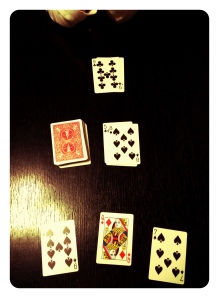The morning begins in a gelid parking lot, a car lurches to a stop, steam from the exhaust pipe obscures the license plate. In the morning’s odor a whiff of diesel from a bus mixes with the smell of partially combusted gasoline. A small girl looks out a befogged window. She opens the door of the car. She climbs out of the back seat and buttons her overcoat, heat from inside envelops her, convection currents distort the air above her head. As she pulls a mitten from her pocket she doesn’t notice me fall. All I can do is watch her and her mother rush through the bitter morning into school.

Ever hopeful, little bunny stuffy waits for his owner to return.
You, reader, believed that there, on the cold ground, my gaze was glued to their disappearing backs, their hands interlocked like gears, in a vain attempt to turn them around and to retrace their steps through the cemetery of lost friends lying lifeless in their rocky pantheon. But who can say that I am not fleeing from the mother and daughter as much as they seem to be retreating from me? However, the result would not change much: even if she fetched me from ground and replaced me in her warm pocket, my stitched smile would still express an inner fear. Despite, or perhaps because of, her affection, which at times represented for me an unwelcome and exhausting burden, I inevitably would be lost, dropped or left behind, my absence noticed too late.
As he approaches he notices a stuffy lying next to his car. Although last time he felt sorry for the child who lost a kitten keychain, he did little more than take a photo and try not to back over it as he left. Today, he pauses, feeling once again a sympathetic twinge for the unknown child who lost her stuffy. He bends down and picks it up.
That afternoon, while waiting for her mother, a little girl can’t find her bunny stuffy. She wanted to show her friend. She checks both coat pockets. It’s not there. She rummages through her book bag, double checks her pockets, looks in her desk. She doesn’t know where to look. It’s lost. She starts to weep.
It’s dark in this drawer, dark but warm and cozy with all the other stuffies. I am thankful to the man who found me and brought me in out of the cold. However, the result did not change much: although he fetched me from the ground and turned me in to lost and found, my stitched smile still expresses my inner fear. I know now that despite her affection, I am lost.
Something was bound to go wrong for me.…



You must be logged in to post a comment.